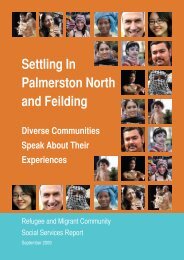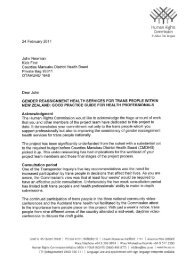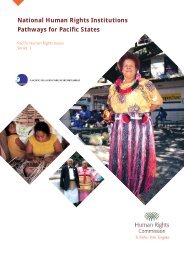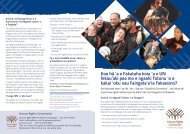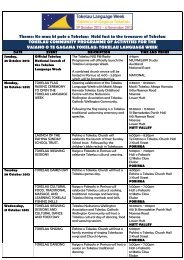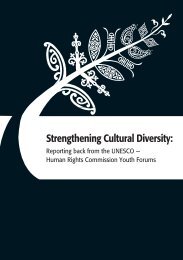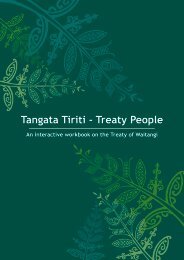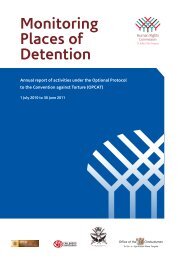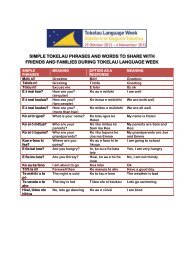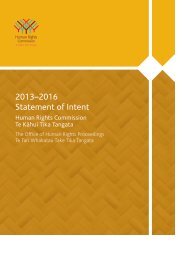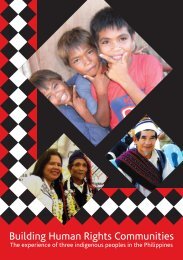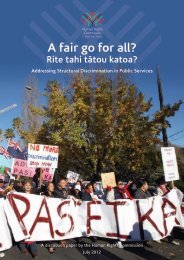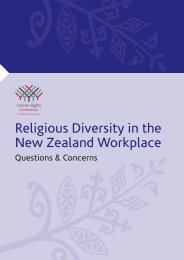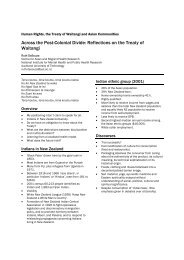Gender Reassignment Health Services for Trans People within New ...
Gender Reassignment Health Services for Trans People within New ...
Gender Reassignment Health Services for Trans People within New ...
Create successful ePaper yourself
Turn your PDF publications into a flip-book with our unique Google optimized e-Paper software.
<strong>Gender</strong> <strong>Reassignment</strong> <strong>Health</strong> <strong>Services</strong> <strong>for</strong><strong>Trans</strong> <strong>People</strong> <strong>within</strong> <strong>New</strong> ZealandMEETING MINUTESMeeting Minutes Type of Meeting Reference Group – Video ConferencingDate 21 st June 2010Time5.30pm – 7.00pmLocationAuckland, Waikato, Wellington & DunedinChairpersonRick FranklinMinutes taken by Lena Craw<strong>for</strong>dAttendees Name Role/Team InitialsAmie Clisby <strong>Trans</strong> Community WellingtonJohn Delahunt Endocrinologist WellingtonEleanor Carmichael Paediatrician WaikatoChris McEwan Surgeon WaikatoRuth Barnett RNZCGP DunedinJoey MacDonald <strong>Trans</strong> Community DunedinSimon Hatcher Psychiatrist AucklandPaul Bohmer Funding & Planning ADHB AucklandMax Lawson <strong>Trans</strong> Community AucklandJack Byrne Human Rights Commission AucklandJohn <strong>New</strong>man CMDHB – Project Team AucklandCathy Parker <strong>Trans</strong> Community AucklandRewi Chaplow CMDHB – Project Team AucklandRachel Johnson CMDHB – Project Team AucklandApologiesAgenda No. Meeting Topics1. Introductions2. Background & Purpose of Project3. Discussion/Feedback on documents4. Recommendations to further project5.Thoughts and feedback on other resources or contacts relating toproject6. Overall thoughts on ‘tool‐kit’ and database7. Wrap Up
• Royal College of Psychiatrists. (2006). Good practice guidelines <strong>for</strong> theassessment & treatment of gender dysphoria. London, UK: The RoyalCollege of Psychiatrists.Feedback: This document is only a draft which has died and there<strong>for</strong>enot appropriate to use. However it is useful as we can learn fromthem• Harry Benjamin International <strong>Gender</strong> Dysphoria Association. (2001).Standards of Care <strong>for</strong> <strong>Gender</strong> Identity Disorders (6 th ed.). HarryBenjamin International <strong>Gender</strong> Dysphoria Association. (No feedbackgiven <strong>for</strong> this document)• Human Rights Commission. (2007). To be who I am: report intoinquiry of discrimination experienced by trans people. Auckland:Human Rights Commission. (discussed below)4. Recommendations to further project4.1. The following include questions and suggestions given by members:• Are the guidelines <strong>for</strong> primary or secondary sector? Guidelines need toidentify all areas.• Will the guidelines be seen as Ministry of <strong>Health</strong> guidelines? Who willown or house the guidelines? Ministry of <strong>Health</strong> looked at the HRCInquiry Report and followed up with this project which aims to getclinicians to develop their own guidelines. HRC involvement includesparticipating on the reference group but will also continue to takein<strong>for</strong>mation back to Ministry of <strong>Health</strong>. This project is commissioned byMinistry of <strong>Health</strong> which means they will be an interested in what wedevelop but they will not be MOH guidelines. Guidelines are not ownedby CMDHB – no one owns copyrights.• What status will guidelines have? This project is commissioned byMinistry of <strong>Health</strong> which means they are interested in what we developbut they will not be MOH guidelines. Guidelines do need to be endorsedby various Colleges and/or <strong>New</strong> Guidelines Group. Collectively thisgroup is able to have stronger influence compared to an individualpractitioner• Will surgery be included in these guidelines as the discussion documentsalso include it? One approach has been to mainstream some surgeriesthat are provided in the public health system <strong>for</strong> trans people e.g. breastaugmentation. Looking at needs and benefits is a non‐discriminatoryapproach that potentially provides a way <strong>for</strong> trans people to accessthese surgeries. The District <strong>Health</strong> Boards decide what is locallyavailable. Four regional centres and half centres in Hamilton andDunedin. Each centre should provide the same service.• Will counselling also be included with these guidelines? Results in theHRC inquiry strongly highlighted the importance of counsellors andthere<strong>for</strong>e recommend they be included in this reference group.
5.2. What should be added into clinical discussion?• BC publications give option of injections rather than patches. 3‐monthinjections available in Australia but not NZ – Would the guidelines dolook at various treatments? Pharmac could respond really well to thisgroup. Managed to get Pharmac to fund blockers.5.3. Equipping consumers with guidelines is another way of en<strong>for</strong>cing guidelines.5.4. Wikki Website – suggested as one option <strong>for</strong> sharing resources amongst referencegroup members flow of discussion.6. Database In<strong>for</strong>mation• <strong>Health</strong>point – sign in sheets available on CMDHB website <strong>for</strong> people toregister. This will help to build database of health professionals.Thank you all <strong>for</strong> attending. Meeting closed.Next MeetingNo. Location Date Time1.234AUCKLAND‐Greenlane Clinical Centre, Building10, Level 1, Rm 245HAMILTON‐Children's clinic level B3 ElizabethRothwell BuildingWELLINGTON: Level D Clinical Service Building(CSB) Meeting Rm 3DUNEDIN‐ Dunedin Paeds located on the 3rdfloor of the Children's Pavilion at DunedinHospitalMonday 23 rd AugustMonday 23 rd AugustMonday 23 rd AugustMonday 23 rd August5.30‐7.30pm5.30‐7.30pm5.30‐7.30pm5.30‐7.30pm



